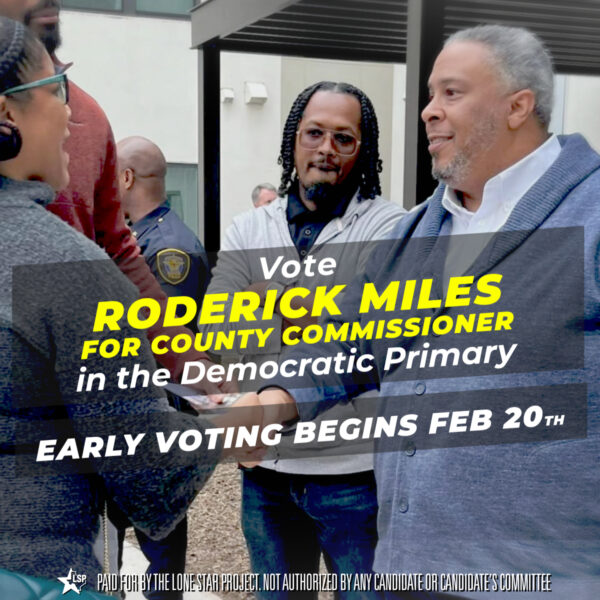Those who have followed the Texas congressional re-redistricting scandal recognize von Spakovsky as the political hatchet-man within the Department of Justice Voting Rights section who overruled eight career civil rights professionals to approve the DeLay map and, in the process, undermine the voting strength of minority Texans across the State. (Source: Houston Chronicle, December 3, 2005)
Hans von Spakovsky’s activities both before and after his time at DOJ clearly identify him as a partisan hack who failed in his duty to provide public service. He used his power as a DOJ official to enforce laws in a manner that sought to achieve partisan gain for Republicans. Now, with von Spakovsky appearing before them and under oath, Senators will have an excellent opportunity to expose the partisan agenda he pursued at DOJ, as well as a host of other improper activities during his career that have been aimed at disenfranchising minority voters. (Source: Washington Post, June 8, 2007)
Questions for Hans von Spakovsky
Following are a series of questions suggested by voting rights and election law expert J. Gerald Hebert that go beyond von Spakovsky’s personal history and seek real information and insight about an Administration that has put partisan gain and political expedience above the law of the land.
(Read Hebert’s full letter to the Rules Committee here)
The 2003 Approval of the Texas Congressional Re-redistricting Plan
Q. When you approved the Texas map over the objections of career staff, did you prepare any written memo explaining the legal basis for your decision? Did you prepare any documents analyzing the Texas plan? If so, produce them.
Q. During the time that the Texas congressional re-redistricting plan was pending approval before the Department of Justice (i.e., October 21, 2003, through December 22, 2003), did you communicate via email or any other way with any person outside the Department of Justice regarding the re-redistricting plan? If so, produce all such emails or other records regarding such communications.
Q. During the time that the Texas Legislature was in session in 2003, did you ever communicate with any member of Congress, any congressional staff person, or any person working in the White House about the ongoing Texas congressional redistricting battle? If so, who did you communicate with and describe the details of those contacts and the form they took (phone, email, etc.). Produce all emails or other records regarding each such communication.
Q. When Texas state legislators, in order to block a controversial mid-decade congressional redistricting, fled first to Oklahoma and later to New Mexico in 2003 to deny Republicans a quorum in the Texas Legislature, did you discuss that situation with any staff person or official in the White House, on Capitol Hill, in the Texas Legislature, or in the State of Texas? If so, list all persons and describe in detail what you talked about.
Q. Once the Department of Justice made the decision to approve the Texas plan in December 2003, did you or Brad Schlozman communicate that decision by phone or email to any person in Texas or the White House or Capitol Hill? If so, who did you contact and describe what was said.
The DOJ Approval of the Georgia Voter ID Bill
Q. In 2005, did you communicate with any Georgia (GA) legislator or legislative staff member, or anyone working with members of the GA Legislature, while that voter ID bill was being considered or being discussed? If so, name all persons contacted and describe the details of those contacts.
Q. When the GA bill was submitted to the DOJ for approval (June 13, 2005), did you communicate with any person in Georgia about the bill? If so, who did you communicate with and what was discussed.
Q. Produce copies of all emails sent to persons outside DOJ while the GA voter ID bill was pending for preclearance before DOJ (June 13, 2005 to August 30, 2005).
(Source: J. Gerald Hebert, former federal prosecutor of civil rights cases in the United States Department of Justice for more than 20 years (from 1973 to 1994), and voting rights and election lawyer who served as legal counsel to Democratic Members of Congress in Texas.)
Additional Questions Suggested by the Lone Star Project
Conflicts of Interest
Q: What was your role in the 2000 Bush-Gore recount? Who asked you to go to Florida? Did you meet Texas Solicitor General Ted Cruz? What is your relationship with Ted Cruz? Did you communicate with Ted Cruz about Texas redistricting?
Background: Ted Cruz recruited lawyers for the Bush-Gore legal battle including now Chief Justice John Roberts. (Source: The New York Times, July 28, 2005) Hans von Spakovsky participated “to observe the hand counts in Palm Beach County on behalf of the Bush campaign.” (Source: Hartford Courant, November 30, 2000)
Q: Do you know Texas Attorney General Greg Abbott? Describe your relationship with Greg Abbott? Did you communicate with Attorney General Abbott about Texas redistricting?
Background: Greg Abbott and Hans von Spakovsky were part of the same law school class at Vanderbilt in 1984. (Vanderbilt Law School Website)



